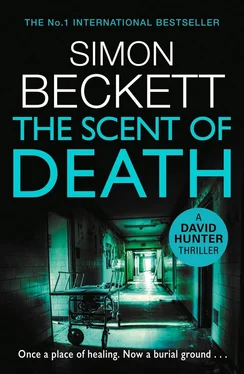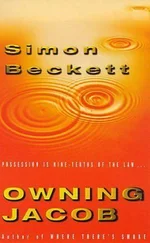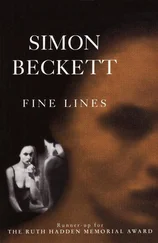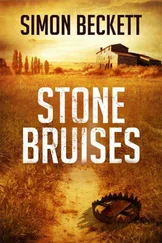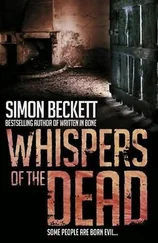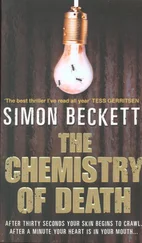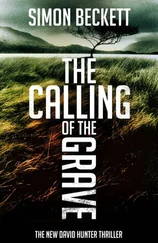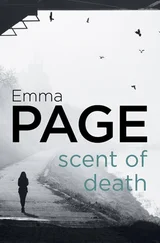‘Where’s Ward?’ I asked. I hadn’t seen her since she’d disappeared after the briefing that morning.
‘Tied up in a meeting, but she’ll be along later. She’d like a word with you when she gets here.’
I nodded, but I wasn’t really listening. As Whelan left, I was already leaning over the remains again, intent on teasing out a rib the size of a fish bone.
It never occurred to me to wonder what Ward might want.
The rooks perched on top of the ruins like monks on the skyline. They might have been carved from stone themselves. Every now and then one or other of them would cock its head or ruffle its feathers, then it would subside and the birds would go back to their silent waiting.
Choked with ivy, the roofless church stood in a clearing surrounded by autumnal trees. Only one gable wall remained standing, an arched window in its centre framing blue sky. The rest had tumbled to crenellated mounds of stone centuries ago, their edges softened by moss and bracken. Lying in its centre was a lightning-struck oak. Although not as ancient as the church itself, it was still old, its gnarled trunk blackened and split a few feet above the ground where the lightning had hit. The mortally wounded tree had thrown up a thicket of new growth around its charred bole, and a few sparse leaves still clung to its branches as though in denial of its own death.
It was hard to believe I was only a stone’s throw from the hospital, still part of London’s urban sprawl. A squirrel paused to scold me as it skittered up a tree trunk, then shot up into the rustling branches. From where I was sitting I watched it go, then closed my eyes and turned my face up to the sun again.
I’d needed to clear my head after I’d finished in the loft. Once the foetal bones had been removed and taken away, recovering the woman’s remains had been straightforward. Even so, I was glad when it was over. The floodlit loft was close and airless, and I was running with sweat inside the coveralls long before I’d finished. It wasn’t just the physical discomfort: I’d grown accustomed enough to that by now. Nor was it purely the sad nature of what I was doing. It was the old hospital itself. St Jude’s seemed to exert a malign pressure, one that grew the longer you were inside. I thought it might lift once I’d climbed down from the stifling loft. But the long, echoing corridors were just as bad. Stinking of mould and urine, they seemed to go on for ever, lit by receding lines of floodlights that served to darken the blackness around them. Open doors offered glimpses into shadowed rooms, empty except for an upended chair or broken trolley. If ever this had been a place of healing, the peeling walls held no memory of it. Only desperation would bring anyone here now.
It was a relief to step outside into daylight. Even the diesel-tainted air tasted sweet in comparison. The respite was only temporary, though. The post-mortem on the woman and her unborn child wasn’t scheduled until next morning, and in the interim there were still the other victims in the sealed room. As soon as the wall was down I’d be going back inside St Jude’s.
Taking off my coveralls, I’d collected a sandwich and a bottle of water and gone around to the back of the hospital to see what was there. Behind St Jude’s was a scene of ordered devastation. The cracked tarmac was marked with the faded white lines of car-parking spaces, and head-high mounds of rubble showed where the outbuildings had once been. Protruding from one of these, a weed-covered hummock of broken bricks and concrete, was a battered sign that read Morgue deliveries around rear .
Fifty yards beyond it was a dark green line of trees. Remembering what Ward had said about the woods behind St Jude’s, I’d set off towards them. I’d almost been turned back by a police dog handler patrolling the outer cordon that had been set up, but after a brief explanation he’d let me pass.
The wood wasn’t very big: in this part of the city it couldn’t be. A line of rusted railings, pointed like spears and canted at odd angles, formed a boundary between its trees and the hospital grounds. They were half hidden behind undergrowth, and I wasn’t sure at first if I’d be able to find a way through. But a section of the spear-like railings had collapsed, leaving a yard-wide gap. A thin ribbon of worn path showed I wasn’t the first person to discover it so, pushing through the scratching branches, I stepped into the wood.
It was a different world. This wasn’t some recent planting, the fast growth of inner-city landscaping. The trees here were ancient: broad, twisted oaks and beech. They closed around me as I walked in, and after a few paces St Jude’s and the rest of London might not have existed.
I didn’t plan to go very far, but when I saw a brighter dapple of sunlight through the branches up ahead I headed towards it. Ward had mentioned there were the ruins of a Norman church in the woods, but I’d forgotten until I entered the clearing and saw the crumbling stone walls. The church must have been quite a landmark when the land surrounding it had been fields or forest. Now only a solitary gable remained standing, overgrown with ivy that clambered over its stones as though slowly drawing it into the ground.
Stepping over a worn stone block draped with moss, I picked my way into what would have been the church nave. Open to the sky, it was almost filled by the lightning-struck oak. Skirting round the massive trunk, I sat down on a grass-covered mound of fallen masonry and ate the tasteless sandwich. If I strained I could just make out the distant sound of traffic, a muted rushing that could almost be the sea. Then a breeze stirred the branches and even that was lost. With my eyes closed and the sun on my face, I felt St Jude’s finally begin to loosen its hold.
I must have drifted off. Suddenly, I came awake, with a prickling awareness that I was no longer alone.
A woman was standing on the edge of the clearing.
I hadn’t heard her approach. Stoutly built, she looked in her seventies, though it was hard to tell. Her brown coat looked too heavy for the weather, and the scuffed training shoes were an ill match for the thick tights she wore with them. An empty bin bag hung from one hand, rustling slightly in the breeze. Her grey hair had a russet tinge that gave it the look of a rusty wire pan scrub, while the face below it was jowly and had an unhealthy pallor. She was breathing hard, with an asthmatic wheeze I could hear even from where I was.
If she was surprised to find me there she didn’t show it. ‘Who are you?’
I climbed to my feet. ‘Sorry, I didn’t mean to startle you.’
‘I didn’t say you had.’ The eyes that regarded me from above the doughy cheeks were small and suspicious. She jerked her chin at the trees behind me. ‘One of that lot, are you?’
‘What lot?’
‘Police. Here for them murders that’s been on the news.’ She looked me up and down. ‘You don’t look like police.’
‘I’m not.’
‘Then what’re you doing here?’
‘Just leaving,’ I said, resigned.
It was time I went back anyway. I picked up the water bottle and the remains of the sandwich, but she hadn’t finished.
‘If you’re not police, what are you? You don’t look like a druggie, neither. And you’re wasting your time if you are. Nobody’s selling.’
‘That’s OK, I’m not buying.’ But she’d snared my interest. ‘How do you know nobody’s selling?’
Ward had told me drugs were dealt from the abandoned hospital, and there was a good chance at least one of the victims could be either a user or a dealer. If this woman had seen anything she might make a potential witness.
She gave a scornful huff. ‘What, with police crawling all over the place? It’s like an ants’ nest.’
Читать дальше
